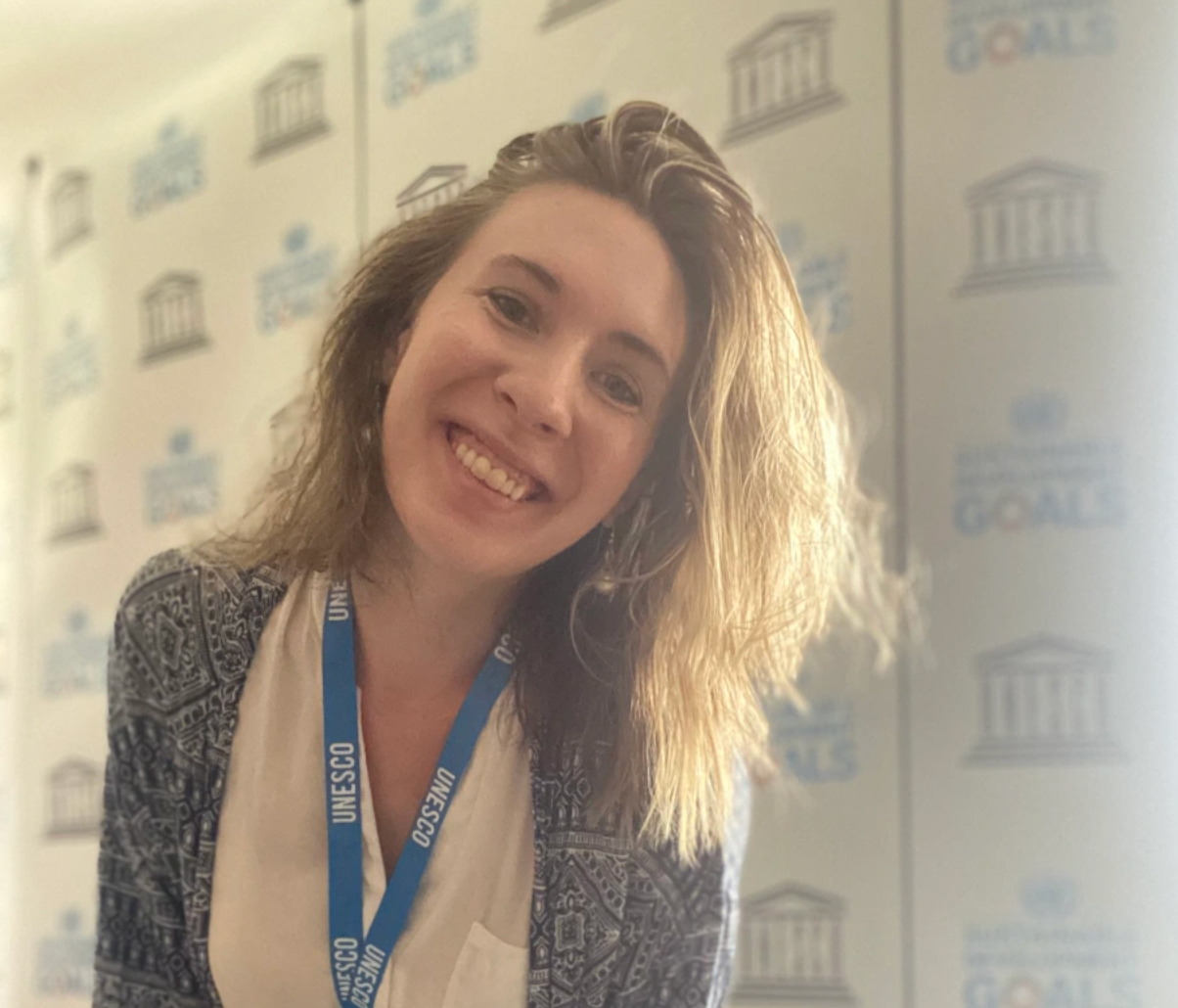Greetings from Jakarta! My name is Hayley Pottle, and I am a GW UNESCO Fellow for the Summer 2022 cohort. I am thrilled to be completing a three-month hybrid fellowship with the Education Unit of the UNESCO Jakarta office in Indonesia. The Education Unit of the Jakarta office is also the Regional Science Bureau for Asia and the Pacific covering five Cluster Countries of Brunei Darussalam, Indonesia, Malaysia, Philippines, and Timor-Leste. The first portion of my fellowship was remote and virtual which then transitioned to in person and focused on developing awareness and knowledge of the UNESCO agency, the role that the Jakarta office serves across Communication, Culture, Education, Information and Science and the second portion of my internship focused on completing specific tasks to support the Education Unit’s programs. This is a fascinating office to support as the South-East Asia region is dynamic and diverse across many areas including economy, religion, politics, and cultures.
Despite what could be considered a small team at the office, the scale and impact of the work is massive. As the Asia-Pacific region engages more than two-thirds of the world’s population, it faces massive variation in societal terms including cultural, economic, political, and religious aspects. The office works closely with necessary stakeholders in the region including local and national governments, national commissions, and other governmental as well as non-governmental stakeholders to implement their programs across all five cluster countries. The scope of work of the UNESCO office is extremely diverse and encompasses programs funded directly by the UN (such as member states or headquarters in New York) as well as external donors.
It has been extremely rewarding to learn of the tangible and on the ground impactful efforts being made, particularly for marginalized groups at the Jakarta office. All three of the Jakarta office owned programs focus on underrepresented groups such as women, children, lower socio-economic status communities/individuals and professionals (such as teachers). By providing safe spaces (such as newly built schools and educational buildings), teacher training with culturally appropriate and updated curricula, and science education that provides awareness and solutions to critical global issues such as climate change, the UNESCO office in Jakarta is transforming the lives they serve.
Following the remote and virtual portion of my fellowship, I arrived in Jakarta and was able to dig into the more focused portion of my fellowship experience in person. I was assigned the task to create brochures, leaflets and learning materials on the three education programs in the Education Unit that focus on education for sustainable development, technical and vocational training as well as education sector-wide policies and plans. The objective is to create materials that provide awareness, knowledge, and garner support (public, governmental, and financial) for the transformative work being done to the public and vital stakeholders. Sustainability of these projects is key to being able to ensure long-term positive impact and improvement of the communities the office serves.
A tour of the city of Jakarta is a must as the city holds a vast array of history, culture, and insights to the country of Indonesia and the region at large. Although Jakarta is currently the capital of Indonesia, it will not remain so. The government announced that the capital will be moved to East Kalimantan (most likely by 2024) due to the immense crowding of the city and traffic issues (I learned the hard way to not order a taxi between 4-7pm/16:00-19:00!). Although Jakarta does have some of the most challenging traffic in the world, there is so much to offer where there are many museums (technically over 70!), food available (any kind anywhere – truly 24/7!). Whether it be a street cart, or at one of the many malls, mealtimes blend throughout the day and allow people to connect with one another.
I had the pleasure of getting to visit the National Monument in Central Jakarta in the center of Merdeka Square. This monument was built to honor the struggle for Indonesian independence. Inside and at the connected museum, there are emblems and representations of Indonesian heritage and culture. Below you can see the national emblem of Indonesia called the Garuda Pancasila. The five emblems of the shield represent the five principles of Indonesian ideology. The star representing “Belief in One Supreme Gold” and is symbol among the faiths of Islam, Christianity, Hinduism, Catholicism, Buddhism, and other ideologies as well, demonstrating Indonesia’s commitment to diversity. The gold chain and red background demonstrates the “Just and Civilized Humanity” with the chain showing the succession of human generations. The Banyan Tree represents unity with its expanding branches. The bull represents democracy and the rise and cotton sustenance and livelihood.
I am very grateful for the UNESCO Jakarta Office for their ongoing support in my fellowship experience, my current employer the Institute of International Education as well as my university George Washington University for the incredible opportunity to learn and support my academic journey here.
Thank you – Terima Kasih!
Hayley is a Master of Arts Candidate in International Education and is passionate about empowering youth and women to be global citizens and utilize their STEM skills for a better, more collaborative and cooperative world.





